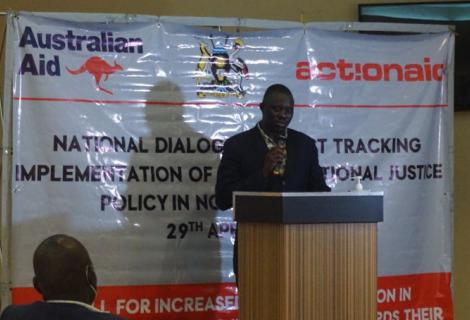Stakeholders recommend new proposals for transitional justice in Northern Uganda.

The Lord’s Resistance Army (LRA), a militant group led by Joseph Kony waged a war of attrition against the government, the people of Uganda ,and nearby countries for more than two decades.
The people in northern Uganda were the most affected by the war with more than a million of them displaced from their land and into protected displacement camps. The LRA became infamous for its reliance on child soldiers and abducted more than 30,000 boys and girls. Children were put on the front lines of combat and were even forced to kill, mutilate, and rape family members, schoolmates, neighbors, and teachers. Girl children were taken as sex slaves for the rebels and many other people lost their lives, property and their loved ones. This went on for many years until the LRA was largely expelled from Uganda by the end 2006.
Although the physical war ended, the community is yet to recover from the effects of this war which include; psychosocial issues, land disputes and reconciliation between families and communities. Today, Northern Uganda remains the poorest region in the country. Following the end of this conflict, the government of Uganda put in place a transitional justice policy designed to address justice, accountability and reconciliation needs, post the war.
On 29th April 2021, AAIU hosted stakeholders in a discussion to assess the progress of the implementation of the transitional justice policy launched by the government in Northern Uganda. Stakeholders present included Members of Parliament, Representatives from the Ministry of Justice, district representatives, survivors of the war including some persons with disabilities, among others.
During her speech, Ms. Stella Lanam, a survivor of the war but also the founder for
War Victims and Children Networking, highlighted that whereas the war seems to have ended, there are after-effects on the victims.
According to Xavier Ejoyi, the Country Director for AAIU, whereas government has looked at recovery of Northern Uganda in terms of only infrastructure, a key aspect of the wellbeing of the victims of the war has been ignored.
"There are still a number of issues like land disputes and mental health. The rate of suicide is high in Northern Uganda, especially among victims of the war and many other post-traumatic disorders that government has not taken interest in,” Xavier said.
He also noted that there is a need to evaluate the process of reconciliation between families in northern Uganda after the Kony war but also rehabilitation process for the victims.
The Leader of Opposition in Parliament Betty Aol Ochan said that whereas the war happened, it affected mostly women and children, adding that many of them are still suffering.
"Many of the victims who were girls then have matured into women and are struggling with life. Many have not been easily accepted in their own families and those of their husbands. The women have many other challenges, which is not necessarily the case with men,” -Ochan said.
From the assessment by the stakeholders, the following areas were identified and recommendations made as a necessity for the full implementation of the transitional justice policy in northern Uganda.
1. The need for assessment of all categories of survivors of the war in the current context in order to provide the necessary gender sensitive support to enable their recovery.
2. The need to provide psychosocial support to survivors who continue struggling with medical and mental health issues.
3. The need for medical rehabilitation of those with disabilities arising from conflict. To develop a Social Protection Policy that caters for the war victims, Persons with Disabilities, and other vulnerable groups.
4. Equal Opportunity Commission should have an inclusive budgeting and planning for war victims.
The stakeholder engagement on transitional justice policy in Uganda was held as a part of the initiatives under the ActionAid Uganda led project dubbed “Women’s land rights and livelihoods in Northern Uganda.”
This project is being implemented by ActionAid International Uganda together with ActionAid Australia with funding from the Department of Foreign Affairs and Trade (DFAT) through the Australian Government.
The three-year project is implemented in Amuru, Nwoya, Gulu and Omoro districts which were the worst affected districts by the Lord's Resistance Army led conflict in Northern Uganda.
The overall objective of this project is to contribute towards reduction of poverty by increasing women’s access, control, and ownership over land and other productive resources in Acholi sub-region.